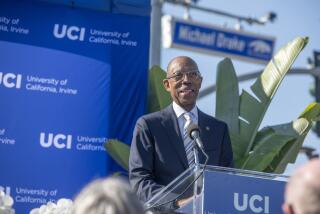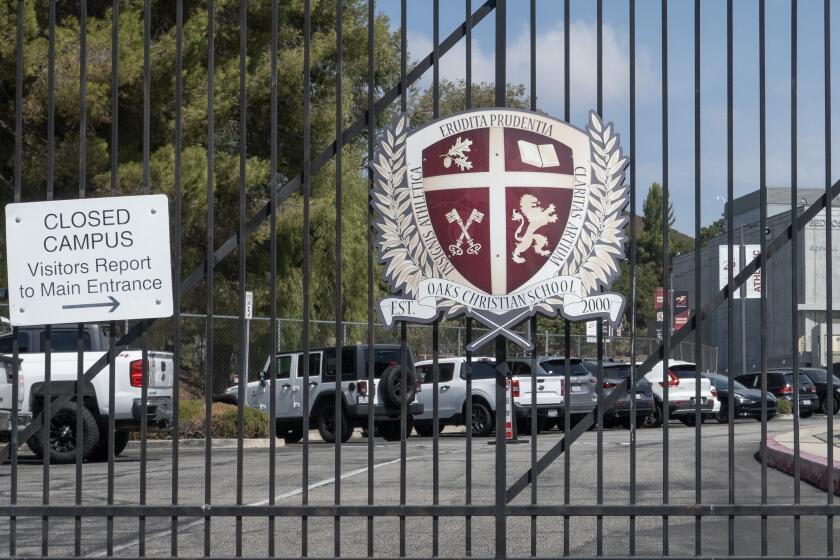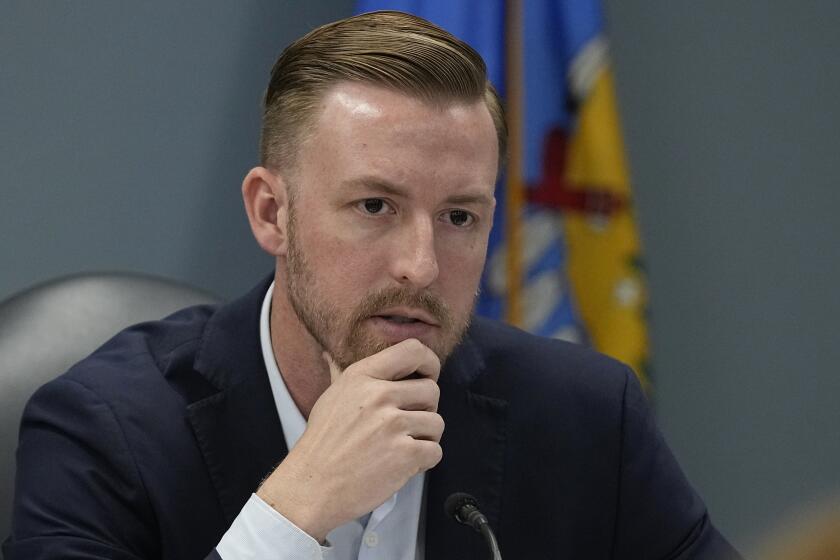UC Vote to End Affirmative Action Echoes Across U.S. : Education: Wilson claims a political victory as Jesse Jackson calls on President Clinton to intervene.
The impact of the University of California regents’ historic decision to eliminate race as a factor in hiring and admissions rippled through classrooms and across America on Friday, galvanizing forces on both sides of the issue for an epic political and social battle.
The issue was immediately injected into the 1996 presidential race as the Rev. Jesse Jackson pressured President Clinton to intervene in the university’s decision of what Jackson called “ethnic cleansing” and Gov. Pete Wilson took to the national news shows to boast about the victory he orchestrated.
“I was the first presidential candidate to bring this issue up and, I think more to the point, the first one to do anything about it--the only one to do anything about it,” Wilson said Friday on NBC TV’s “Today Show.”
Meanwhile, California’s prestigious university system faced a looming crisis as state Democratic legislators threatened to cut funding over the regents’ decision and university officials expressed fear for their safety on campuses as well as a heartfelt disappointment in the institution.
“I’m starting my 46th year at UC as a faculty member and administrator and yesterday was the worst day of my life,” UC Santa Cruz Chancellor Karl S. Pister said. “The decision was wrong. It was done in a political environment that was totally inappropriate. . . . I worry that we’ve set a very bad example for the rest of the country.”
Education leaders predicted that California’s decision--which came during a tense, 12-hour meeting in San Francisco that was interrupted by a bomb threat, riot police and a room-clearing protest--is likely to be repeated nationwide.
“There is no question that what happens in the University of California affects higher education profoundly,” said Robert Atwell, president of the American Council on Education, the leading organization of colleges and universities. “You do have the possibility here of a prairie fire. Those of us who believe in these programs must do everything we can to douse the flames.”
At week’s end, the issue of affirmative action, which has been part of a simmering national debate since November’s election, had exploded onto the front burner.
Clinton, under pressure to lead his party on the delicate balance of jobs and race relations, declared in a long-awaited national speech Wednesday that he supports a “full-throated” commitment to preference programs for women and minorities.
Barely 24 hours later, in a dramatic showdown between Jackson and Wilson, the University of California Board of Regents voted 14 to 10 and 15 to 10 for a pair of measures that constitute the nation’s most sweeping rollback of affirmative action laws.
After the first measure was passed, Jackson locked arms with more than 100 protesters in the packed regents meeting room and sang “We Shall Overcome.” The regents, who fled out of fear for their safety, reconvened the meeting privately in another section of the building and passed the second measure about 9 p.m.
One proposal requires UC to stop using “race, religion, gender, color, ethnicity or national origin” as criteria in its admission decisions unless applicants can prove that race or other factors had been barriers to their success. The policy change takes effect Jan. 1, 1997.
A similar provision governs the hiring and contracting practices as of Jan. 1, 1996. The proposals, made by Regent Ward Connerly, a Wilson appointee, also recommend that UC increase the percentage of students it admits solely on the basis of academic achievement, and call for a marked increase in funding for outreach programs to better prepare students from underrepresented ethnic groups to become eligible to attend UC.
The regents’ vote and Clinton’s speech combined this week to define the arguments and the players on both sides of a volatile issue that continued to echo Friday. The day’s developments also included:
* In Sacramento, Assembly Democratic Leader Willie Brown said many of his 39 members in the lower house told him the UC system is “not worthy of being given the opportunity to be fully funded” because the regents showed a “lack of independence” by siding with Wilson.
Assemblyman John Vasconcellos (D-Santa Clara), the Democrats’ leading budget expert, also sent a letter to the regents saying their decision makes it “virtually impossible” for him to support a budget that includes “any money whatsoever” for the regents.
“You have absolutely forfeited your right to govern what was the world’s most prestigious university by engaging in a blatant political act,” Vasconcellos said. “How dare you rush to judgment--according to no public interest timetable--to join the desperate effort of a presidential candidate to jump- start his non-start campaign.”
* In a telephone call with Atty. Gen. Janet Reno, Jackson asked that the U.S. Justice Department seek a restraining order against the implementation of the university regents’ decision on the grounds that it violated civil rights laws.
Jackson argued that the U.S. Supreme Court ruled that it is not inappropriate for race to be considered one of many factors in government decisions. Federal officials said they will look at the matter but added privately that they did not believe a restraining order is likely because the court’s ruling did not require that race be included as a factor.
* Demoralized university officials and faculty said that the fear of violence on California campuses--termed a “state of siege” by one regent--was so great that it may cause some employees to seek jobs elsewhere. Officials also expressed concern that the decision would hinder the university system’s search for a new president.
* On national morning talk shows, Wilson continued his heated exchange with Jackson, charging that the civil rights leader was conducting “an effort at intimidation.” He also dismissed the allegations that he has embraced the issue of reverse discrimination to promote his presidential ambitions as “utterly bogus.”
Wilson appeared to be the biggest winner coming out of the week’s events, scoring a high-profile national touchdown at a time when he badly needed a victory. The governor’s presidential race has been hampered lately by a series of miscues, bad luck and controversies--such as the state budget that is overdue and bogged down in acrimonious negotiations.
Wilson’s campaign hoped that the regents’ meeting would put their candidate back on the Republican radar after he had slipped behind his chief rivals for the GOP nomination. The victory appeared to give him that boost and more, offering Wilson a defining momentin which he was portrayed as the leading spokesman for anti-affirmative action forces.
Jackson and Wilson are scheduled to appear this Sunday on ABC TV’s news program “This Week With David Brinkley.”
Jackson used Thursday’s vote to pressure Clinton for more aggressive action in fighting the opponents of affirmative action. He said the President’s speech Wednesday was good, but he added that it “was a finger in the dike.”
“While he’s making the speech, the dam is breaking and . . . the flood of racism . . . is leaking every place,” Jackson said. “What Wilson has proposed must now be challenged by President Clinton.”
Jackson called on Clinton to aggressively enforce anti-discrimination laws and to gather a conference of national leaders representing a range of economic and demographic groups for the purpose of redirecting the nation’s moral compass.
At the White House, presidential adviser George Stephanopoulos said that Jackson’s call is consistent with Clinton’s plan.
“Clearly the President is committed to his position of fixing affirmative action and fighting attempts to completely wipe it away,” Stephanopoulos said. “If the regents’ decision has the effect of wiping away the entire program in California, it is something the President opposes.”
In San Francisco, as the regents resumed their meeting Friday, several of UC’s chancellors, faculty and administration members appeared demoralized.
“All of us who have responsibility for the operation of the university recommended against the action taken by the Board of Regents,” UCLA Chancellor Charles E. Young said. “We are clearly disappointed, and believe as we indicated that it will be harmful to the university.”
Several UC officials said the challenge now is to interpret the board’s action in a way that will do the least damage. In its decision, the regents also ordered the university to confer with faculty and develop supplemental admissions criteria that will ensure the student body remains diverse.
Specifically, the board suggested that the university consider economic need or social environment including an “abusive or otherwise dysfunctional home or a neighborhood of unwholesome or antisocial influences.”
UCLA’s Young was one of several officials who said it will not be easy to come up with such a policy.
Asked if he could suggest any new specific criteria that would continue the goal of diversity, but not include race, Young said, “I can’t imagine what those would be at the present time, if there are any.”
Pister said he found it flatly ridiculous that the regents had given UC officials “a blueprint that says, ‘Do something different--we don’t know what it is, but do something different.’ ”
The decision comes at an unsettling time for UC, which has suffered under years of budget cuts and is about to experience a serious leadership vacuum. UC President Jack W. Peltason is due to retire Oct. 1, while Provost Walter Massey, UC’s second in command, will leave Aug. 12 to become president of Morehouse College in Atlanta.
On Friday, the regents’ presidential search committee met. When members emerged, they said the board’s affirmative action decision made their job very difficult.
“There isn’t a prospective candidate for a job as the new president who isn’t aware of what happened yesterday and maybe is thinking that the University of California is not as viable an option,” said Regent Roy T. Brophy, chairman of the committee. “Four years ago, we could have gotten any president in the nation. Yesterday, we could have gotten a lot. Today, I’m worried.”
Political writer Dave Lesher reported from Sacramento and education writer Amy Wallace reported from San Francisco. Times staff writer Dan Morain in Sacramento also contributed to this story.
More to Read
Sign up for Essential California
The most important California stories and recommendations in your inbox every morning.
You may occasionally receive promotional content from the Los Angeles Times.










